List of colonial buildings in Medan
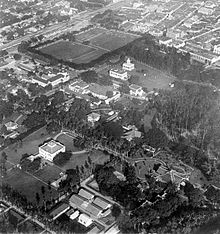
A variety of infrastructure were constructed in the city of Medan during the colonial period of Dutch East Indies, which is now Indonesia. Following the establishment of the Deli Company in 1869, the city was transformed rapidly from a small kampong (village) of a few hundred people into the largest city in Sumatra. When the Sultan of Deli moved his residence there in 1891, Medan became the capital of North Sumatra. Subsequent rapid development ushered in a western-centric architectural style used in a number of colonial buildings built in Medan.[1][2] These buildings range from houses, offices, hotels, stores, houses of worship, hospitals, and schools.[3] Despite its relatively late modernization compared to older cities like Jakarta and Makassar, Medan has an abundant colonial architectural heritage. 42 buildings have been officially declared of significant historical value.[4]
Medan is divided into three settlements. The colonial settlement is the city centre and contains central government infrastructure, the shopping area of Kesawan, the military area between the Deli and the Babura Rivers, the affluent tropical garden city of Polonia, the central market, as well as various churches, hospitals, schools, factories, train stations, and the former airport. The Chinese settlement is a dense area on the eastern side of the Deli River, and intersects with Kesawan. The sprawling Muslim native settlement is located around three Muslim architectural works: the Istana Maimun (1888), Istana Lama (late 19th-century, now demolished) and the Great Mosque (1907) at the southern end of the city next to Kesawan and the Chinese settlements. Here, the Dutch redesigned the main buildings in an Orientalistic-Imperialist style, symbolising the dominance of the colony's cultural and political control.[5]
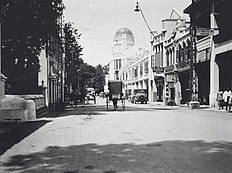
Medan's architecture, was closely linked to Penang Island's, as wealthy residents and the colonial government hired British and Dutch architects from the Straits Settlements. The central open plaza was called the Esplanade, similar to the one in George Town; it is now called Lapangan Merdeka. Shophouse construction and facades mimic those in the Straits. Kesawan's architecture fuses Dutch-British Tropical styles. Like other Indies cities, junctions were designed as nodes, where the corner buildings have a unique facade facing the junction. These included towers, a rounded or oblique construction, or a set-back, giving each building a unique look resulting in different urban nodes. Examples include the AVROS building (now the BKS-PPS building) and the warenhuis (department store; now the mostly-abandoned Angkatan Muda Pembaharuan Indonesia building).[5]
Despite this abundance, many colonial buildings are being demolished or in threat of being demolished. Non-governmental organizations claimed that almost 90% of the 42 protected buildings had either been demolished or modified, despite provincial ruling No. 6/1988 which bans the tampering of these buildings. 73 buildings had not yet been protected; an example is the Mega Eltra building, constructed in 1912. It has since been demolished. Other heritage buildings that have been demolished are the Kerapatan building on Jl. Brig. Jen. Katamso, a bank building on Jl. Pemuda and the Public Works office on Jl. Listrik.[4] These events are reasoned to the lack of city planning by the city's officials and the minimal awareness of history in Medan.[3]
List of buildings
[edit]Eclecticism (before 20th century)
[edit]Some of the first colonial buildings of Medan were concentrated around the "Esplanade" (now the Lapangan Merdeka), the station area, and around the Sultan's palace. Many of the first buildings were simple wooden structures, such as the hoofdkantoor van de Deli Maatschappij te Medan (The head office of the Deli Company in Medan), which during the time of its opening in 1870 was also used for a church, an administration building, a hospital and a feast hall,[6] and the large wooden Old Sultan's Palace.
| Last official name | Former names | Year | Architect | Location | Latest image | Oldest image |
|---|---|---|---|---|---|---|
| Agentschap van de NHM (Netherlands Trading Society) Demolished in 1930, on its site the Nederlands-Indische Handelsbank (now Bank Mandiri) was constructed |
Agentschap van de NHM | 1888[7] | anonymous | 3°35′20″N 98°40′41″E / 3.588925°N 98.677956°E | ||
| Dharma Deli Hotel | Hotel De Boer[8] | 1896[9]-1898[8][10] | 3°35′30″N 98°40′37″E / 3.591598°N 98.676851°E |  |
 | |
| Dinas Kebudayaan dan Pariwisata, (Department of Culture and Tourism) | Deli vrijmetselaarsloge | 1892[11] | anonymous | 3°35′39″N 98°40′50″E / 3.594070°N 98.680533°E | ||
| Grand Hotel Medan (demolished, now Bank Negara Indonesia - KCP Medan Pulau Pinang)[12] |
Hotel de Vink[12] | 1884[12] | 3°35′22″N 98°40′47″E / 3.589329°N 98.679815°E |  | ||
| Hoofdkantoor van de Deli Maatschappij (demolished, and replaced with larger building in 1910)[10] |
Hoofdkantoor van de Deli Maatschappij | 1869-1870[10] | anonymous | 3°35′35″N 98°40′31″E / 3.592962°N 98.675214°E | ||
| Istana Maimun | Istana Maimun | 26 August 1888 - 18 May 1891[13] | Theo van Erp,[13] Ferrari[13] | 3°34′31″N 98°41′02″E / 3.575234°N 98.683829°E |  |
 |
| Kerapatan Deli, first building (demolished)[14] |
Delische Rijksraadgebouw[14] | anonymous | 3°34′47″N 98°41′04″E / 3.579600°N 98.684417°E |  | ||
| Lapangan Merdeka | de Esplanade | 1880 | anonymous | |||
| Masjid Raya Al-Osmani Mosque | 1872 | 3°43′56″N 98°40′34″E / 3.732337°N 98.676074°E |  | |||
| Old Sultan's Palace (razed in 1946) |
Istana Lama | late 19th-century | 3°34′37″N 98°41′20″E / 3.577059°N 98.688879°E |  | ||
| Paleis van de Tengku Besar van Deli (destroyed by fire in 1921)[14] |
Istana Tengku Besar Deli | late 19th-century |  | |||
| Piaggio/Vespa (revamped, only the facade remained) |
1900s[15] | 3°35′11″N 98°40′46″E / 3.586291°N 98.679437°E | ||||
| Seng Hap (abandoned, deteriorated) |
生合[16] | 1900[16] | anonymous | 3°35′19″N 98°40′43″E / 3.588479°N 98.678514°E |  |
 |
| Rumah Sakit PT Perkebunan Nusantara II Tembakau Deli, "PT Perkebunan Nusantara II Deli Tobacco Hospital" | Hospitaal Deli Maatschappij[17] | 1885 | ||||
| Rumah Tjong A Fie | 張阿輝 故居 | 1900s[18] | 3°35′08″N 98°40′50″E / 3.585519°N 98.680507°E |  |
 | |
| Sociëteit De Witte (first form, demolished)[12] |
Sociëteit De Witte (first form) | 1882[12] | ||||
| Standard Chartered Bank | Ambtswoning van de resident van het Oostkust van Sumatra (1898),[19] Governor's house in Medan (Gouverneurshuis te Medan) | 1898[19] | anonymous | 3°35′00″N 98°40′33″E / 3.583471°N 98.675941°E |  |
 |
Rationalism and Traditionalism (1900s – 1920s)
[edit]New technological possibilities gradually transformed the architectural style used in Medan into a modern form. Two architectural movements appeared in the Netherlands and the Netherlands East Indies: Dutch Rationalism and Traditionalism.[20]
The works of Hendrik Petrus Berlage were the main inspiration for Dutch Rationalism; the subsequent style in the tropical climate of Indonesia is known as the New Indies Style.[21] The style is the result of an attempt to develop new solutions to integrate traditional precedents with new technological possibilities. The best example in Medan is the Medan Post Office, a fusion of Romanesque arch, traditional Dutch-styled gables, and new technology.
The Traditionalist movement appeared in the 1910s. It is basically the revival of the late 19th-century eclecticism, but was inspired mainly by classicism. The best examples in Medan are Bank Indonesia (the former Javasche Bank, 1909) and the old Medan City Hall (1909). Unlike earlier low-quality architecture, the new traditionalist movement made use of modern materials, for example reinforced concrete and steel frames behind its classical facade. The classical facades are mostly of natural stone. The monumental character of this style was popular for offices, warehouses and garages.[20]
| Last official name | Former names | Year | Architect | Location | Latest image | Oldest image |
|---|---|---|---|---|---|---|
| Chung Chow School | 祌州学校 |  | ||||
| Abandoned building (2004-now)[10] |
Hoofdkantoor van Deli Maatschappij, head office of the Deli Company,[6] Director's Office of PT Perkebunan IX (1959) | 1910[6] | D. Berendse[6] | 3°35′35″N 98°40′31″E / 3.592962°N 98.675214°E |  | |
| Angkatan Muda Pembaharuan Indonesia (neglected, heavily deteriorated) |
Medan's Warenhuis (1919), Kantor Departemen Tenaga Kerja Tk. I Sumut | 1919[22] | G. Bos[22] | 3°35′18″N 98°40′37″E / 3.588343°N 98.676836°E | 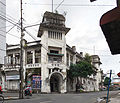 |
|
| Asuransi Jasindo | Stoormvaartmaatschappij Nederland en Rotterdamse Lloyd; Nederlands-Indische Handelsbank, NIH (until 1940) | early 20th-century | 3°35′19″N 98°40′42″E / 3.588661°N 98.678436°E |  | ||
| Asuransi Jiwasraya | Nederlandsch-Indische Levensverzekerings en Lijfrente Maatschappij (NILLMIJ) | 1919[22] | Thomas Karsten[22] | 3°35′03″N 98°40′48″E / 3.584277°N 98.680138°E |  |
|
| Bank Indonesia | De Javasche Bank[6] | 1909[6] | Eduard Cuypers[23] | 3°35′27″N 98°40′37″E / 3.590752°N 98.676977°E |  |
 |
| Bioskop Bali (demolished, now Vihara Medan) |
Oranje Bioscoop; Gedung Kesenian;[24] Restoran April Mop;[24] Bioskop Bali (post-independence)[24] | 1908[24] | possibly BOW | 3°35′24″N 98°40′52″E / 3.589886°N 98.681097°E |  |
 |
| BKS PPS (Badan Kerja-sama Perusahaan Perkebunan Sumatera), (Sumatra Planters Association) (1967) | AVROS (Algemeene Vereeniging van Rubberplanters ter Oostkust van Sumatera)[25] | 1918[22] | G.H. Mulder[22] | 3°35′04″N 98°40′50″E / 3.584420°N 98.680551°E |  |
 |
| Dharma Niaga | Carl Schlieper | 1919[26] | 3°35′06″N 98°40′49″E / 3.585066°N 98.680220°E | |||
| Ford Motors Reparatie Werkplaats (abandoned, dilapidated) |
Ford Motors Reparatie Werkplaats | 3°35′14″N 98°40′33″E / 3.587162°N 98.675871°E | ||||
| Gedung Balai Kota Lama | Raadhuis, Gemeentehuis Medan[6] | 1908-1909[6] | Ch. M. Boon[6][27] | 3°35′25″N 98°40′38″E / 3.590380°N 98.677188°E |  |
 |
| Gereja Kristen Indonesia Sumatera Utara | Gereformeerde Kerk | 1918 | Tj. Kuipers | 3°35′02″N 98°40′18″E / 3.583877°N 98.671651°E |  | |
| HKBP Sudirman Medan | Elisabethkerk[28] | 1 August 1912[29] | 3°34′39″N 98°40′39″E / 3.577416°N 98.677558°E |  |
||
| Kantor Gubernur Sumatera Utara | Proefstation Deli Tabak[30] | 1913[30] | 3°34′50″N 98°40′20″E / 3.580418°N 98.672145°E |  |
 | |
| Kantor Pos Medan (Medan Post Office) |
Medan Post- en telegraafkantoor | 1909[10]-1911 | S. Snuyf (from BOW)[10] | 3°35′31″N 98°40′39″E / 3.591851°N 98.677404°E |  |
 |
| Katholiek schoolinternaat, (Roman Catholic boarding school) | 1920[31] | anonymous | 3°35′20″N 98°40′07″E / 3.589017°N 98.668682°E | |||
| Kerapatan Deli, second building (demolished in 1946's social revolution)[14] |
Delische Rijksraadgebouw[14] | 1912[32] | 3°34′36″N 98°41′06″E / 3.576757°N 98.684962°E |  |
 | |
| Kereta Api (Persero) Divisi Regional I Sumatera Utara | Hoofdkantoor van de Deli Spoorweg Maatschappij[11] | 1918[11] | Th. Karsten[11] | 3°35′38″N 98°40′47″E / 3.593770°N 98.679736°E |  |
 |
| London Sumatera | Harrisons & Crossfield[16] | 1909 | 3°35′19″N 98°40′41″E / 3.588613°N 98.678080°E | 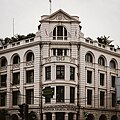 |
 | |
| Masjid Raya Medan | Grote Moskee Masjid Raya |
1909 | Van Erp, JA Tingdeman | 3°34′30″N 98°41′14″E / 3.575111°N 98.687321°E |  |
 |
| Mega Eltra | Lindeteves-Stokvis (1912); BPM (1952) | 1912 | ||||
| Tirtanadi Water Tower | Watertoren van Ajer Beresih Waterleiding Maatschappij en omgeving[33] | 1908[33] | 3°34′56″N 98°41′06″E / 3.582158°N 98.685049°E |  |
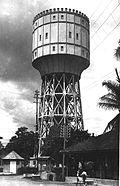 | |
| Pasar Boender, (Round Market) (demolished, on its site stands the monument of Guru Patimpus) |
Pasar Petissah, Pasar Petisah | 1915[31] | anonymous | 3°35′29″N 98°40′16″E / 3.591469°N 98.671103°E |  | |
| Pengadilan Negeri Medan dan Pengadilan Tinggi Sumatera Utara, (Medan State Court and North Sumatra High Court) | Raad van Justitie | 1911[34] | 3°35′16″N 98°40′21″E / 3.587658°N 98.672572°E |  | ||
| Petodjo Ice Factory (demolished, on its site stands commercial complex Medan Bisnis Center) | N.V. IJsmaatschappij 'Petodjo' | 1920[31] | anonymous | 3°35′16″N 98°40′04″E / 3.587797°N 98.667875°E | ||
| Pusat Penelitian Kelapa Sawit Medan, (Medan Oil Palm Research Center) | AVROS-proetstation voor de rubbercultuur te Kampong Baroe[22] | 1918[22] | 3°33′24″N 98°41′17″E / 3.556535°N 98.687995°E |  | ||
| Telkom | Telefoondienst van de DSM[35][11] | 3°35′39″N 98°40′46″E / 3.594281°N 98.679577°E |  |
 |
Modernism (1920s-1940s)
[edit]This period saw the emergence of Modernism and its varieties, namely Art Deco, Nieuwe Bouwen, Amsterdam School and other variations. Art Deco evolved from earlier Dutch Rationalism. The form is symmetrical and exudes technological progress and glamour, with rich colors and bold geometric shapes.
In the following period between the late 1930s and 1940s, Art Deco evolved into a new style known as Nieuwe Bouwen (the Dutch term for Modernism) or Functionalism. Instead of creating decorative styles on the facade, the architect creates style in the clear arrangement of space. These Nieuwe Bouwen buildings were less symmetrical and more expressive in form, using simple universal form such as cylinders or tubes, apparent in buildings such as the de Rex cinema building, now the Ria Restaurant (which was clumsily restored as an Art Deco style building) and the new building of the Medan railway station. Architect J.M. Groenewegen has made his mark on many of Medan's Nieuwe Bouwen buildings.[36]
Medan also became the ground for the implementation of Amsterdam School-styled buildings not found in many parts of Indonesia. The St. Elizabeth's hospital (1929) by J.M. Groenewegen and the original plan of Centrale Pasar (destroyed in a fire) show the influence of the Amsterdam School.
| Last official name | Former names | Year | Architect | Location | Latest image | Oldest image |
|---|---|---|---|---|---|---|
| Gemeentelijke Vismarkt |  | |||||
| Stork[15] | 1920s[15] | 3°35′16″N 98°40′43″E / 3.587723°N 98.678539°E | ||||
| Bank BNI Kesawan | Chartered Bank of India, China and Australia[15] | 3°35′12″N 98°40′45″E / 3.586742°N 98.679050°E | ||||
| Bank Danamon Kesawan | Bank of China 中国银行[15] |
1930[15] | 3°35′12″N 98°40′45″E / 3.586637°N 98.679211°E | |||
| Bank Mandiri | Nederlandsch-Indische Escompto Maatschappij[26] | 1927 | Fermont-Cuypers | 3°35′06″N 98°40′50″E / 3.584934°N 98.680689°E | ||
| Bank Mandiri | Nederlands-Indische Handelsbank (NIH)[23] | 1940[23] | C.P. Wolff Schoemaker[23] | 3°35′20″N 98°40′41″E / 3.588925°N 98.677956°E | ||
| Bank Mandiri Medan Lapangan Merdeka (1998) | de Factorij, Nederlandse Handel-Maatschappij (1929);[37] Gunseikanbu (Japanese occupation);[9] Bank Exim[9] | 1929[22] | J. de Bruijn [22][23] | 3°35′22″N 98°40′40″E / 3.589581°N 98.677737°E |  |
 |
| Bata | Warenhuis Cornfield[15] | 1951[15] | H. van den Heuvel[15] | 3°35′11″N 98°40′45″E / 3.586502°N 98.679300°E | ||
| Pusat Pasar | Centrale Pasar 大巴刹 Toa Pa Sat |
J.H. Valk[38] | 3°35′25″N 98°41′09″E / 3.590330°N 98.685849°E | |||
| Dinas Kebudayaan dan Pariwisata, (Department of Culture and Tourism) (deteriorating as of 2016) |
Boekhandel en Drukkerij Varekamp & Co. (Varekamp Bookstore and Printing Co.),[22] Drukkerij J. Hallermann[39] | 1926[22] | 3°35′06″N 98°40′50″E / 3.585084°N 98.680455°E |  |
||
| Gereja Bala Keselamatan, (The Salvation Army) | Weeshuis Leger des Heils;[36] internment camp[40] | Jan 18, 1937[41][36] | 3°34′26″N 98°40′50″E / 3.573849°N 98.680566°E | |||
| Immanuel Church | Nederlandse Hervormde Kerk | 1921 | 3°34′51″N 98°40′23″E / 3.580823°N 98.672941°E | 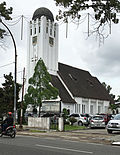 |
 | |
| HKBP Uskup Agung | Batak Protestantschekerk | 25 September 1927 (first stone laid)[42] |
3°34′37″N 98°40′16″E / 3.577081°N 98.671204°E | |||
| Katedral Medan, (Medan Cathedral) | Rooms-Katholieke Kerk, (Roman Catholic Church) | January 30, 1928[43] | J.M. Groenewegen (expansion in 1928)[43] | 3°35′03″N 98°40′53″E / 3.584224°N 98.681374°E |  |
 |
| Kesawan 34 (facade modified with pseudo-classical ornament)[15] |
First half of 20th-century[15] | 3°35′17″N 98°40′42″E / 3.587979°N 98.678450°E | ||||
| Museum Perjuangan TNI | Arnhemse Levensverzekeringsmaatschappij, (Arnhem Insurance) | 1930 | J.M. Groenewegen | 3°35′02″N 98°40′27″E / 3.583795°N 98.674080°E |  |
|
| Oranjeschool (demolished, now Kampus I STTH) |
Oranjeschool[44] | 1941[36] | J.M. Groenewegen[36] | 3°34′36″N 98°40′40″E / 3.576591°N 98.677813°E | ||
| Paradiso Swimming Pool | Zwembad Medan, Zwembad Djalan Radja, Zwembad van de Medansche Zwemvereeniging[33] | 1939[33][45] | J.M. Groenewegen[45] | 3°34′48″N 98°41′06″E / 3.579899°N 98.685081°E | ||
| PD Pasar | de Rotonde; Djawatan Penerangan Propinsi Sumatera Utara (1950s) | 3°35′27″N 98°41′05″E / 3.590754°N 98.684600°E | ||||
| Perguruan Kristen Immanuel, (Immanuel Christian School) | Prinses Beatrix school[36][46] | 1938[36] | J.M. Groenewegen[36] | 3°34′41″N 98°40′34″E / 3.577938°N 98.676022°E | ||
| Perusahaan Listrik Negara, Medan | Nederlandsch Indische Gasmaatschappij (NIGM) | 3°35′09″N 98°40′34″E / 3.585871°N 98.676060°E |  | |||
| PT Perkebunan Nusantara IV | Handelsvereniging 'Amsterdam' (HVA)[47] | 1924[47] | Hulswit-Fermont-Cuypers [47] | 3°34′49″N 98°40′47″E / 3.580365°N 98.679618°E | ||
| Restoran Ria (clumsily restored) |
de Rex | 1930s | 3°35′08″N 98°40′58″E / 3.585575°N 98.682685°E | |||
| Restoran Tiptop | 1934[48] | 3°35′09″N 98°40′47″E / 3.585942°N 98.679679°E | ||||
| Rumah Dinas Gubernur Sumatera Utara, "North Sumatra Governor's Residence" | Woning van 'eilandgewest' Sumatra (1939);[49] Ambtswoning van de gouverneur van de Oostkust van Sumatra (1948)[49] | 1939[49] | 3°34′28″N 98°40′10″E / 3.574505°N 98.669544°E | |||
| Rumah Sakit Militer Putri Hijau, (Putri Hijau Military Hospital) | Kantoor van Deli Planters Vereeniging en Immigranten Bureau | 1920s? | 3°35′59″N 98°40′22″E / 3.599729°N 98.672663°E |  | ||
| Rumah Sakit Santa Elisabeth, (St. Elisabeth's Hospital) | Sint-Elisabeth Ziekenhuis | 1929[47]-1930 | J.M. Groenewegen[47] | 3°34′31″N 98°40′36″E / 3.575231°N 98.676731°E |  |
 |
| Rumah Sakit Umum Daerah Dr. Pirngadi (Dr. Pirngadi Regional General Hospital) | Gemeente Ziekenhuis, (Municipal Hospital); Syuritsu Byusono Ince[50] | August 11, 1928[50] | 3°35′51″N 98°41′17″E / 3.597448°N 98.688127°E | |||
| Sutomo School | Su Tung School 蘇東中學 | 1926[36] | anonymous | 3°35′30″N 98°41′13″E / 3.591731°N 98.687068°E | ||
| SMPN 1 Medan, (Medan junior high school 1) (demolished) |
Gouvernements Muloschool Medan | Early 1920s[36] | anonymous | 3°34′53″N 98°40′28″E / 3.581334°N 98.674462°E |  | |
| Stasiun Kereta Api Medan, (Medan Railway Station) | Station, Medan Station | 1937[51] | 3°35′27″N 98°40′47″E / 3.590879°N 98.679741°E |  |
 | |
| Taman Sri Deli | Derikanpark | 1931-1932[14] | 3°34′35″N 98°41′12″E / 3.576293°N 98.686667°E |  |
See also
[edit]References
[edit]- ^ "History". N.V. Deli Maatschappij. Archived from the original on 13 August 2015. Retrieved 19 August 2015.
- ^ Dick 2002, pp. 95, 103.
- ^ a b Asmyta, Surbakti. "Penghancuran Estetika Kota: Bangunan Bersejarah di Kota Medan". University of North Sumatra. Archived from the original on 21 January 2021. Retrieved 15 January 2021.
- ^ a b The Jakarta Post, 2002.
- ^ a b Widodo, p. 2.
- ^ a b c d e f g h i Loderichs 1997, p. 16.
- ^ Loderichs 1997, p. 109.
- ^ a b Loderichs 1997, pp. 16, 105.
- ^ a b c Widodo, p. 1.
- ^ a b c d e f Leushuis 2011, p. 55.
- ^ a b c d e Leushuis 2011, p. 56.
- ^ a b c d e Loderichs 1997, p. 17.
- ^ a b c Leushuis 2011, p. 70.
- ^ a b c d e f Loderichs 1997, p. 123.
- ^ a b c d e f g h i j k Leushuis 2011, p. 59.
- ^ a b c Leushuis 2011, p. 58.
- ^ "Rumah Sakit Deli Maatschappaij; Ikon Sejarah Kesehatan dan Aspek Legalitas". blogspot.co.id. Archived from the original on 19 April 2017. Retrieved 18 April 2017.
- ^ Leushuis 2011, p. 61.
- ^ a b Leushuis 2011, p. 64.
- ^ a b Gemeentemuseum Helmond, 1990, pp. 20–1.
- ^ Gunawan Tjahjono 1998, p. 120.
- ^ a b c d e f g h i j k l Loderichs 1997, p. 32.
- ^ a b c d e Leushuis 2011, p. 57.
- ^ a b c d AT, M & MR 2012.
- ^ Thamrin 2013.
- ^ a b Leushuis 2011, p. 62.
- ^ "Boon, Ch. M." Archived from the original on 2 August 2016. Retrieved 6 March 2016.
- ^ inetid. "- de Oranje School in Medan -". medanschool.nl. Archived from the original on 9 January 2021. Retrieved 18 April 2017.
- ^ "Gereja HKBP Sudirman Jadi Ikon Sejarah Kota Medan - HKBPMedan.org". Archived from the original on 8 April 2016. Retrieved 22 March 2016.
- ^ a b Leushuis 2011, p. 65.
- ^ a b c Loderichs 1997, p. 28.
- ^ Loderichs 1997, p. 126.
- ^ a b c d Loderichs 1997, p. 122.
- ^ "Pengadilan Negeri Medan - Sejarah Pengadilan". Archived from the original on 31 March 2016. Retrieved 19 March 2016.
- ^ Loderichs 1997, p. 117.
- ^ a b c d e f g h i j Loderichs 1997, p. 25.
- ^ Loderichs 1997, p. 89.
- ^ Loderichs 1997, p. 119.
- ^ "Gedung Dinas Kebudayaan dan Pariwisata Provinsi Sumatera Utara". blogspot.co.id. Archived from the original on 9 January 2021. Retrieved 18 April 2017.
- ^ Loderichs 1997, p. 58.
- ^ "MEDAN Understanding Heritage". m-heritage.org. Archived from the original on 7 April 2016. Retrieved 18 April 2017.
- ^ "MEDAN Understanding Heritage". m-heritage.org. Archived from the original on 7 April 2016. Retrieved 18 April 2017.
- ^ a b "Gereja Katedral Santa Maria Tak Bernoda Asal". blogspot.co.id. Archived from the original on 9 January 2021. Retrieved 18 April 2017.
- ^ De Oranjeschool Archived 9 January 2021 at the Wayback Machine
- ^ a b "Zwembad Medan" [Medan Swimming Pool]. Colonial architecture & townplanning (in Dutch). TU Delft. 2016. Archived from the original on 3 April 2016. Retrieved 3 April 2016.
- ^ inetid. "- Prinses Beatrix school - School in Medan -". medanschool.nl. Archived from the original on 9 January 2021. Retrieved 18 April 2017.
- ^ a b c d e Leushuis 2011, p. 67.
- ^ Leushuis 2011, p. 60.
- ^ a b c Loderichs 1997, p. 147.
- ^ a b "Sejarah RSUD Dr. Pirngadi Medan" [History of Dr. Pirngadi Regional General Hospital]. Rumah Sakit Umum Daerah Dr. Pirngadi (in Indonesian). 2013. Archived from the original on 27 March 2016. Retrieved 27 March 2016.
- ^ Loderichs 1997, p. 107.
Cited works
[edit]- AT; M; MR (28 October 2012). "Walaupun Film Porno Ditayangkan, Bioskop di Medan Tetap Gulung Tikar" [Despite The Screening of Adult Movies, Medan's Cinemas Are Still Closing]. The Aceh Traffic (in Indonesian). Aceh. Archived from the original on 16 March 2016. Retrieved 16 March 2016.
- Dick, Howard W. (2002). The Emergence of a National Economy: An Economic History of Indonesia, 1800-2000. Hawaii: University of Hawaii Press. ISBN 9780824825522. Archived from the original on 23 July 2016. Retrieved 2 March 2016.
- Gunawan Tjahjono, ed. (1998). Architecture. Indonesian Heritage. Vol. 6. Singapore: Archipelago Press. ISBN 981-3018-30-5.
- Het Indische bouwen: architectuur en stedebouw in Indonesie : Dutch and Indisch architecture 1800-1950. Helmond: Gemeentemuseum Helmond. 1990. Archived from the original on 7 August 2023. Retrieved 30 March 2015.
- Janssen, Peter (1 April 2015). "Battle to preserve North Sumatra's smoking past". Nikkei Asian Review. Archived from the original on 5 March 2016. Retrieved 5 March 2016.
- Leushuis, Emile (2011). Gids historische stadswandelingen Indonesië [Guide historic city tours Indonesia] (in Dutch). Amsterdam: KIT Publishers. ISBN 9789460221620. Archived from the original on 7 March 2016.
- Loderichs, M.A. (November 1997). Medan - Beeld van een stad [Medan - Pictures of a city] (in Dutch). Purmerend: Asia Maior. ISBN 9074861105.
- "Medan loses its historical buildings". The Jakarta Post. Jakarta. 5 June 2002. Archived from the original on 5 March 2016. Retrieved 5 March 2016.
- Thamrin, Mahandis Y. (19 August 2013). "Kisah di Balik Kubah Megah AVROS Medan" [Story behind the majestic dome of AVROS, Medan]. National Geographic Indonesia (in Indonesian). Archived from the original on 3 March 2016. Retrieved 3 March 2016.
- Widodo, Johannes. "Medan: The Advent of a North Sumatran Modern City". Medan Heritage. Sumatra Heritage Trust. Archived from the original on 24 December 2015. Retrieved 19 May 2016.
External links
[edit]- "List of Medan Heritage (gives good list, however building information needs to be properly sourced)". Medan - Understanding Heritage. Badan Warisan Sumatra Heritage Trust. 2016. Archived from the original on 20 March 2016. Retrieved 20 March 2016.
